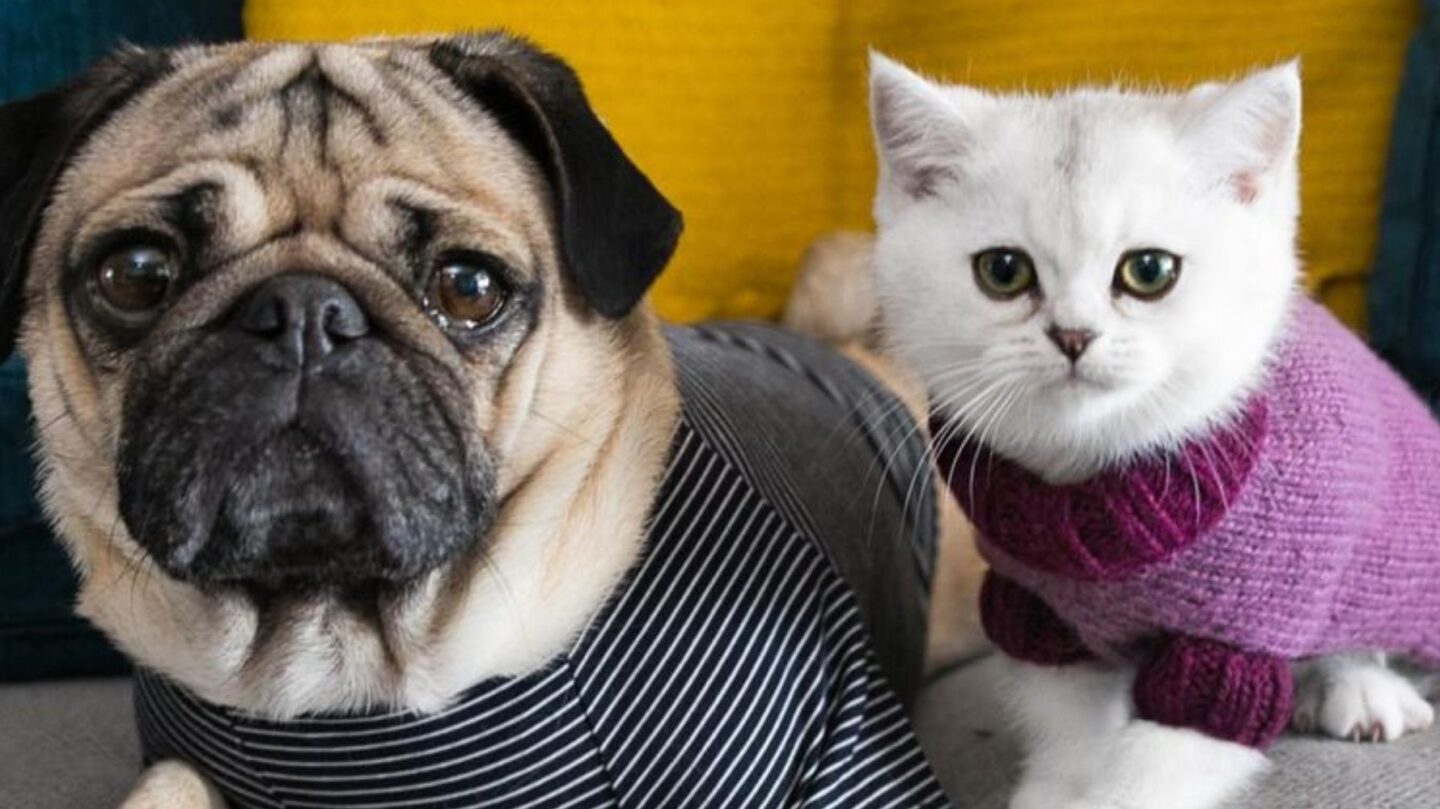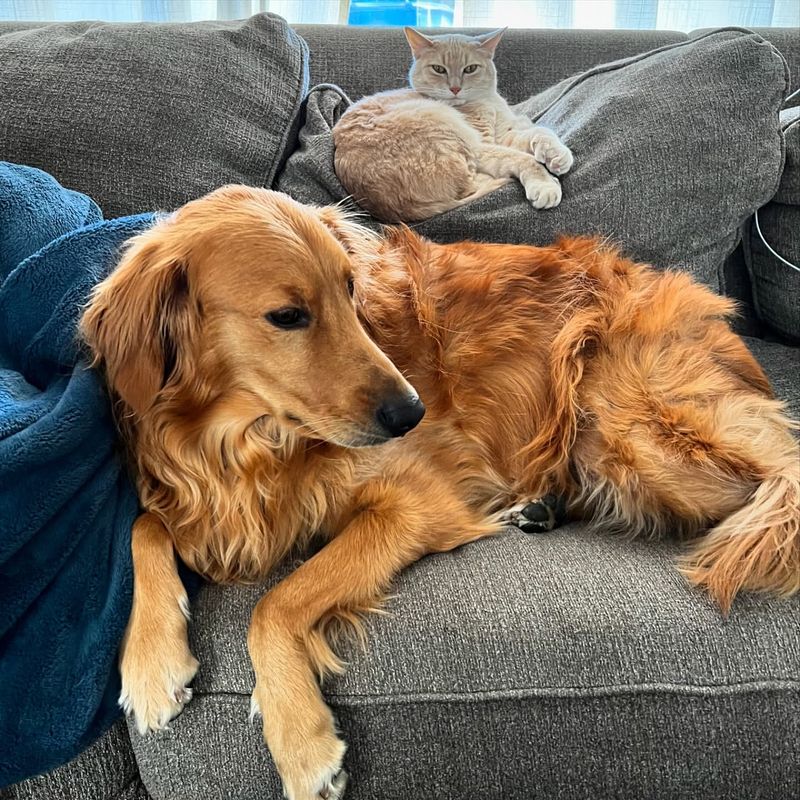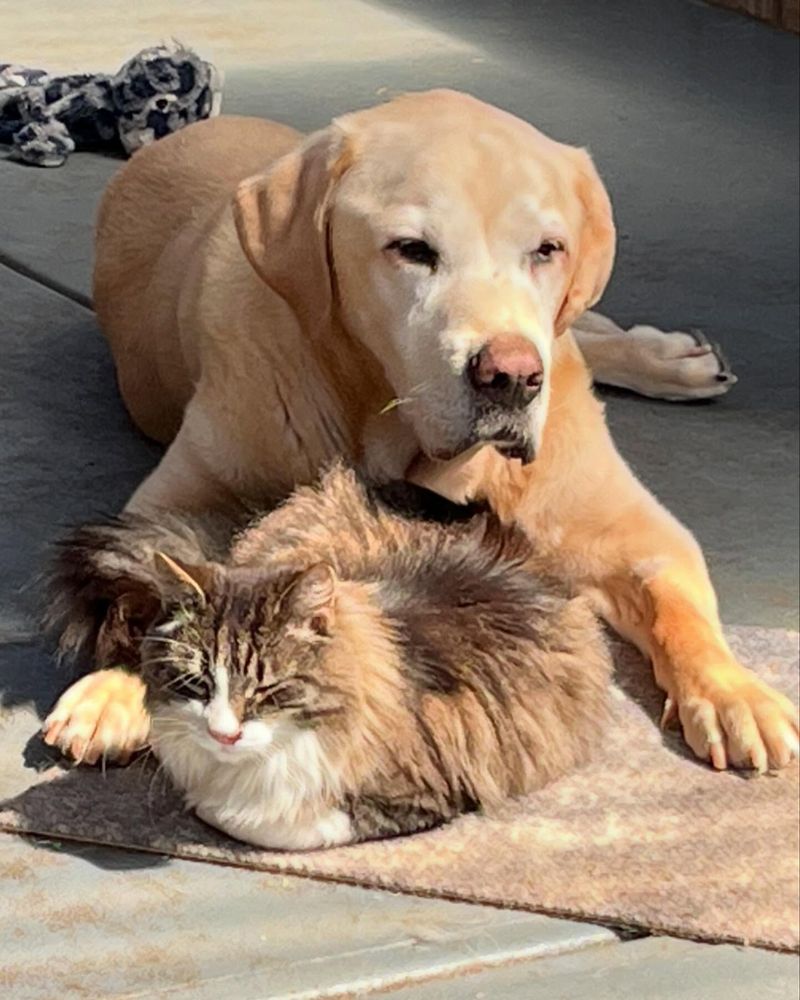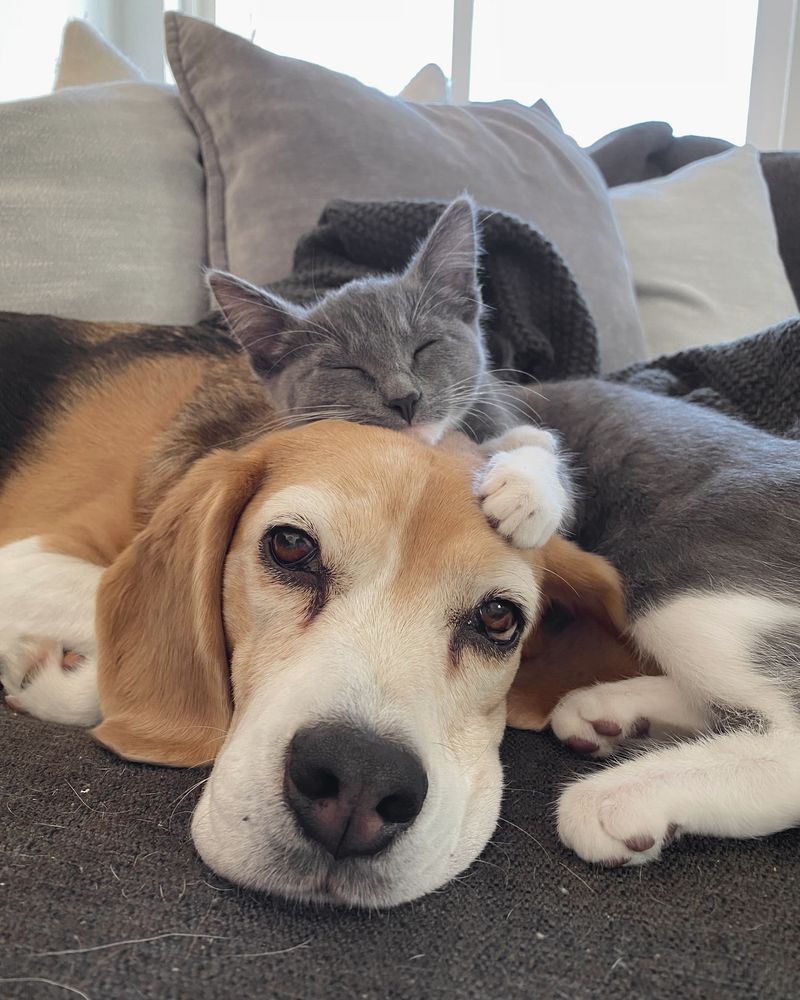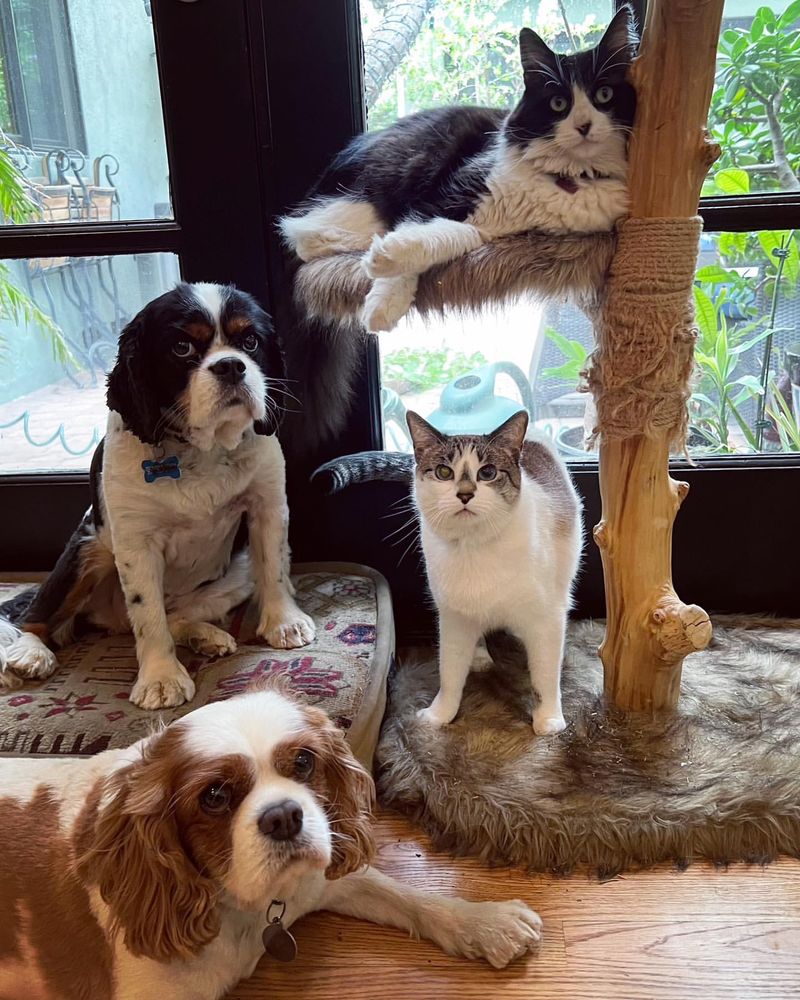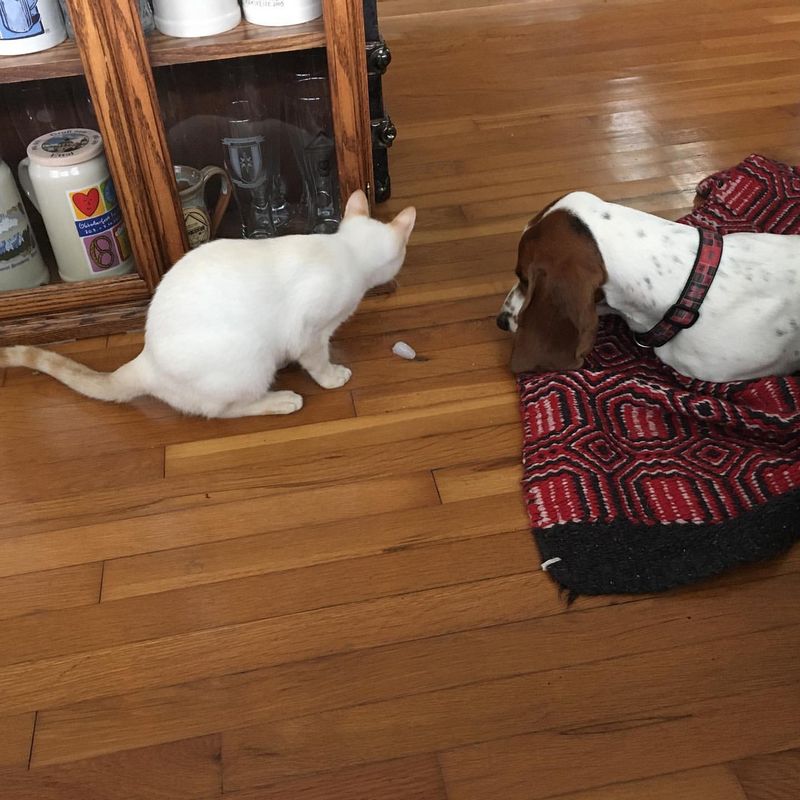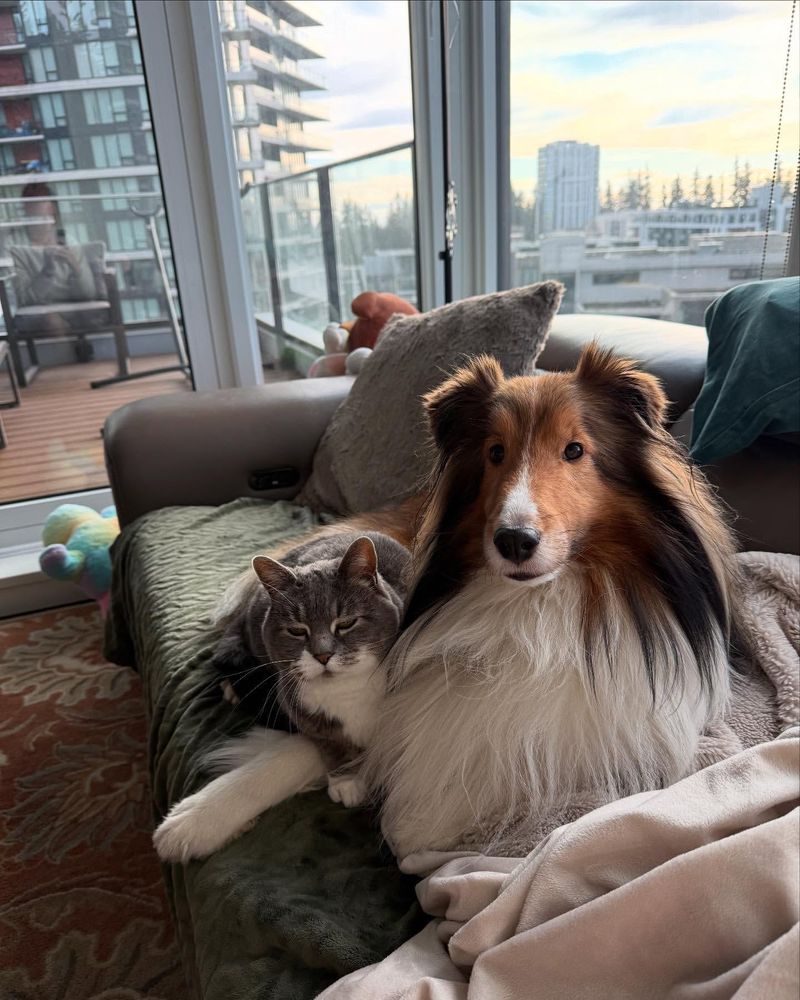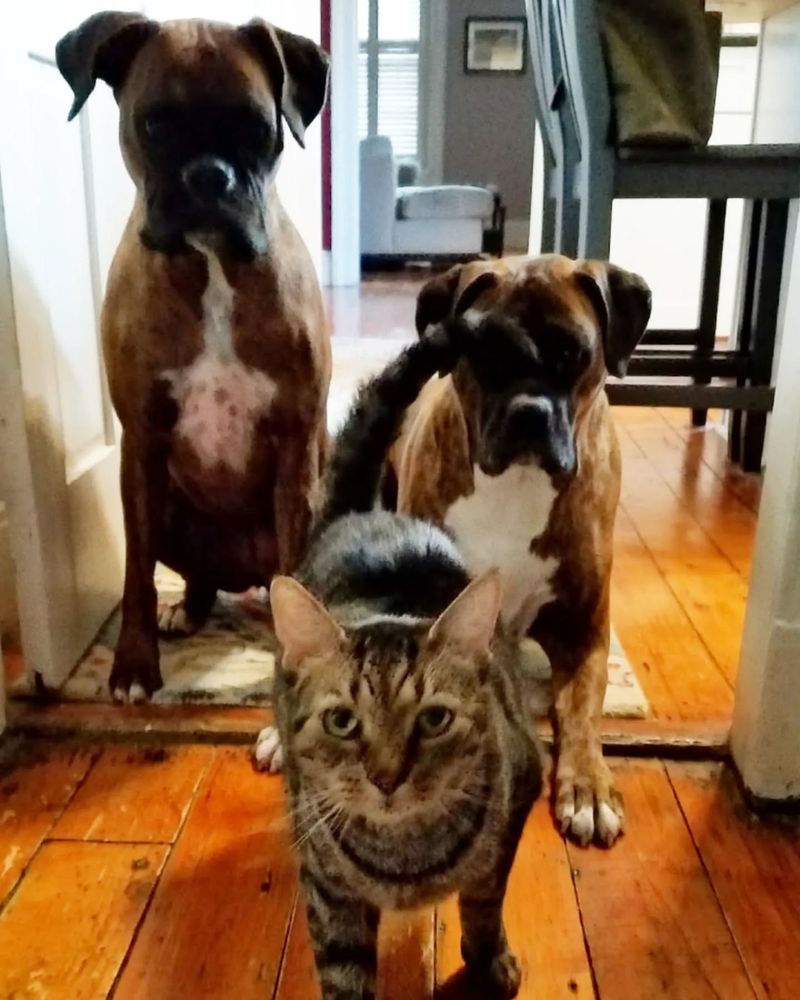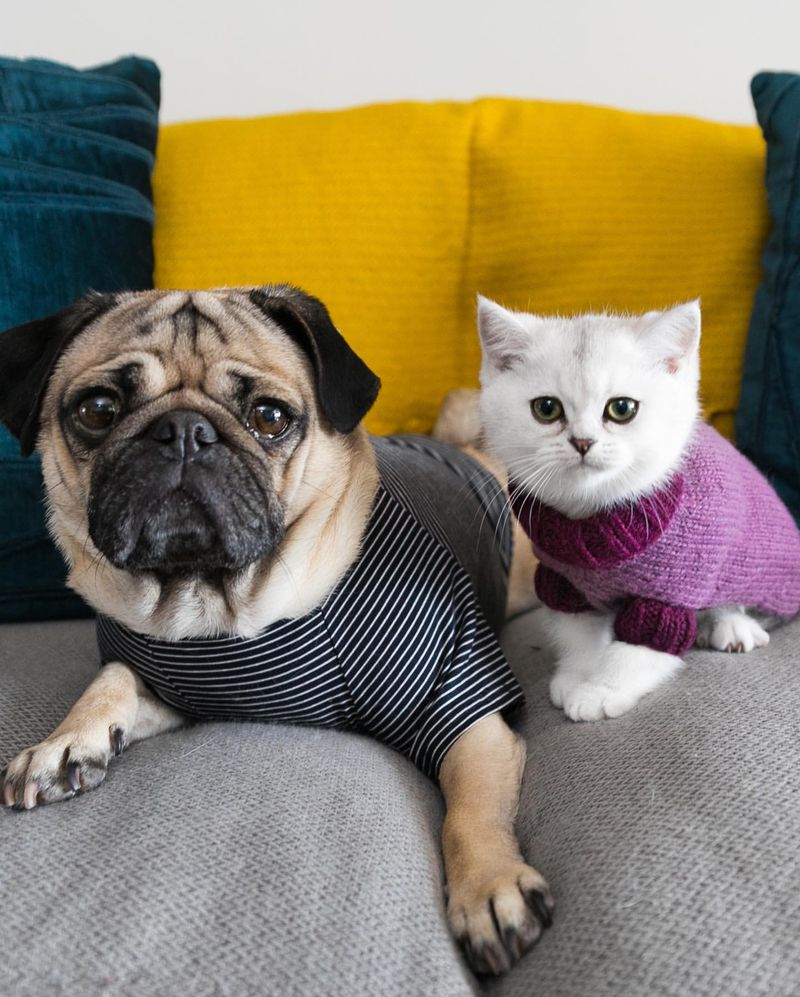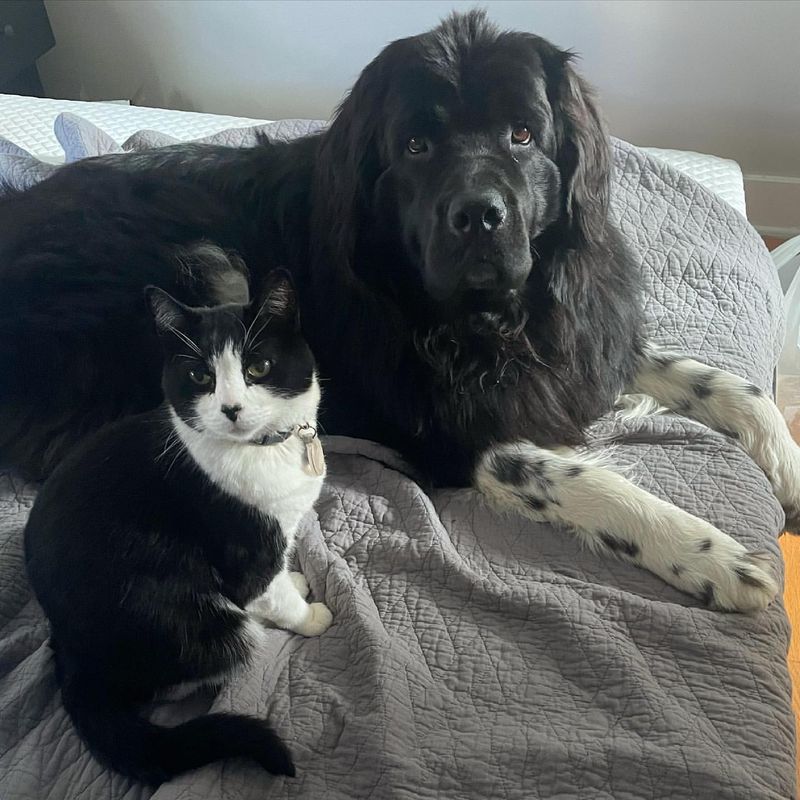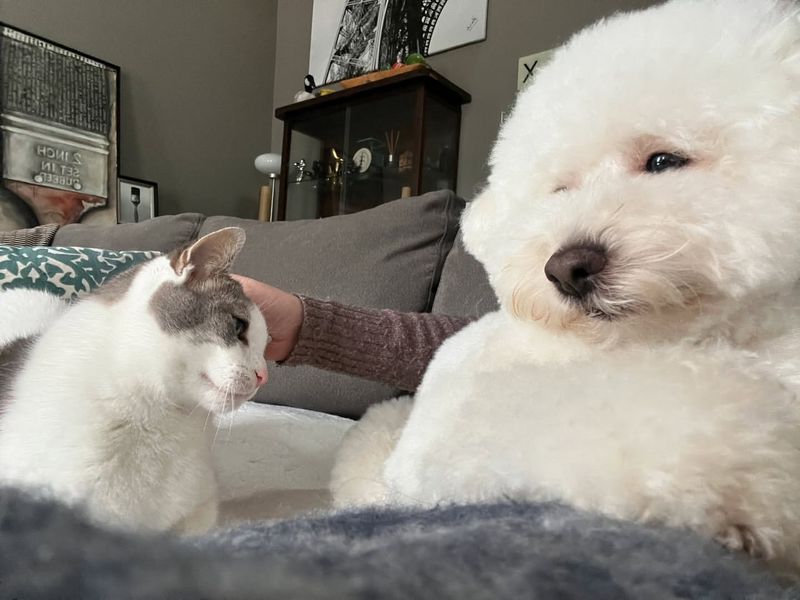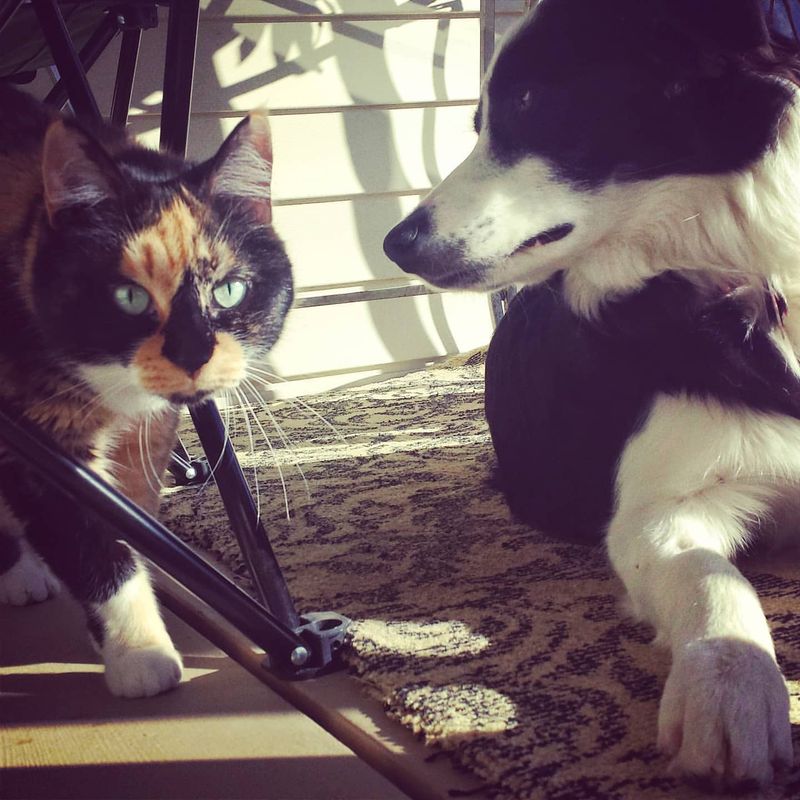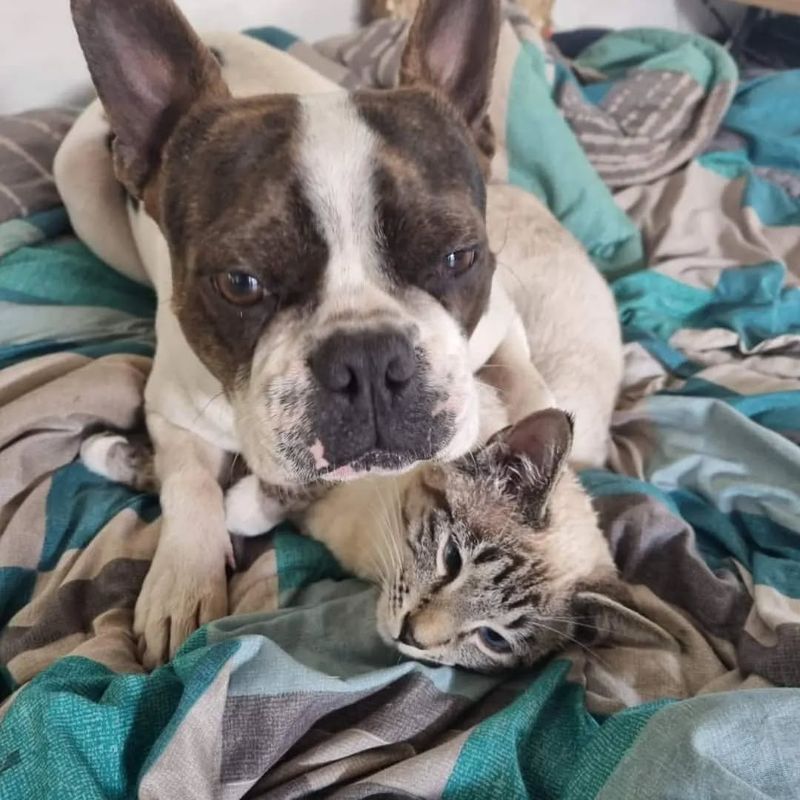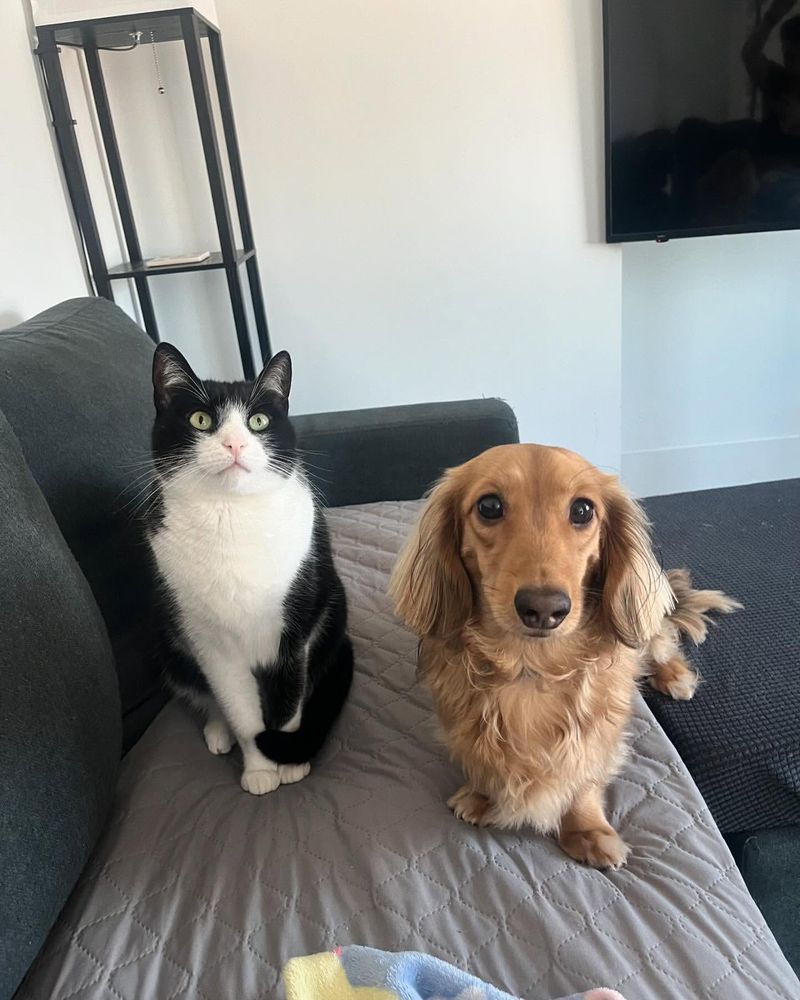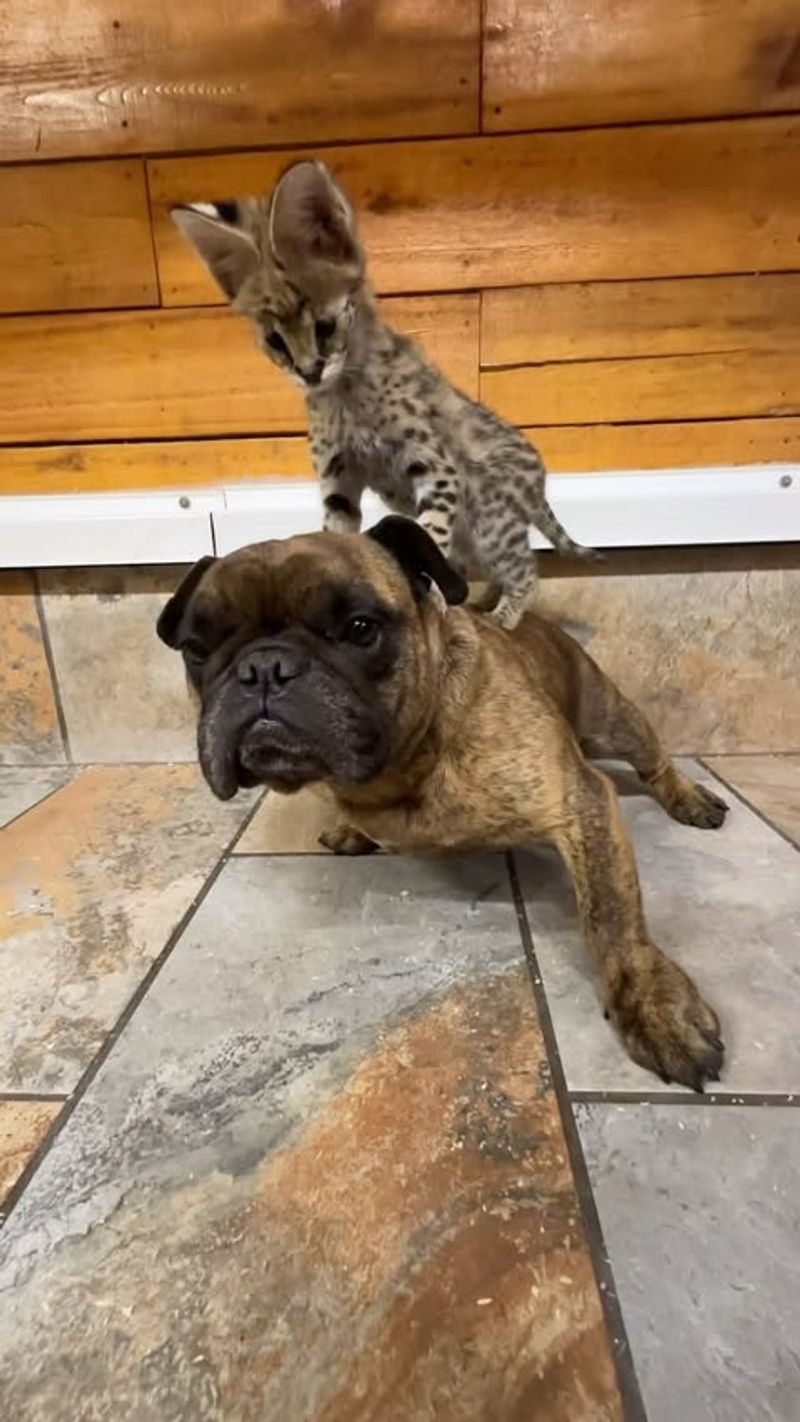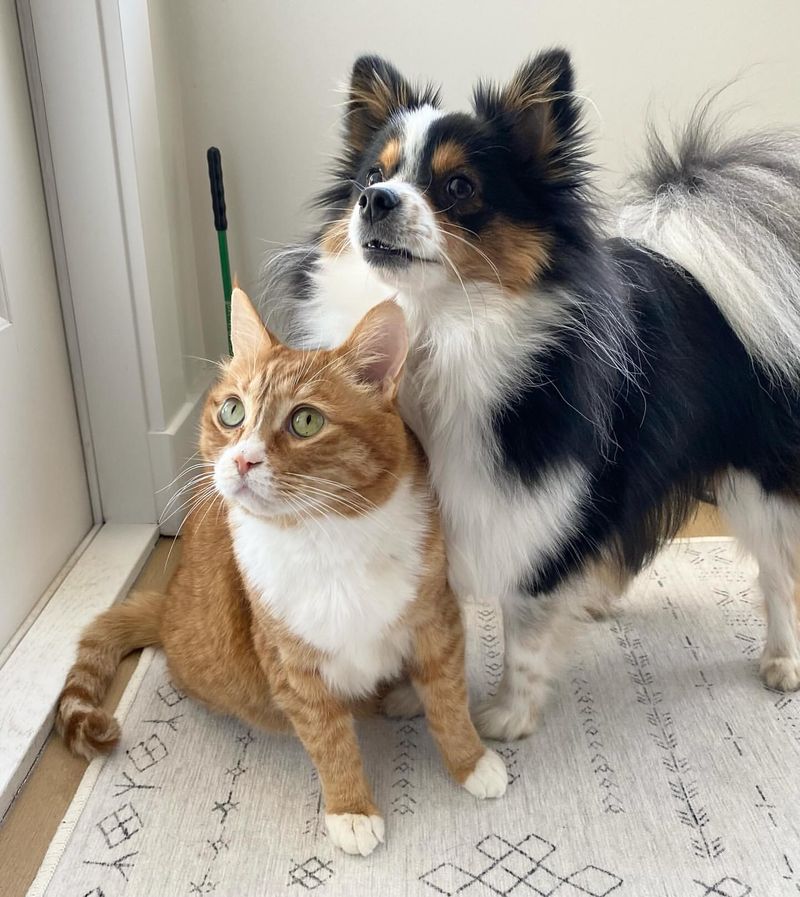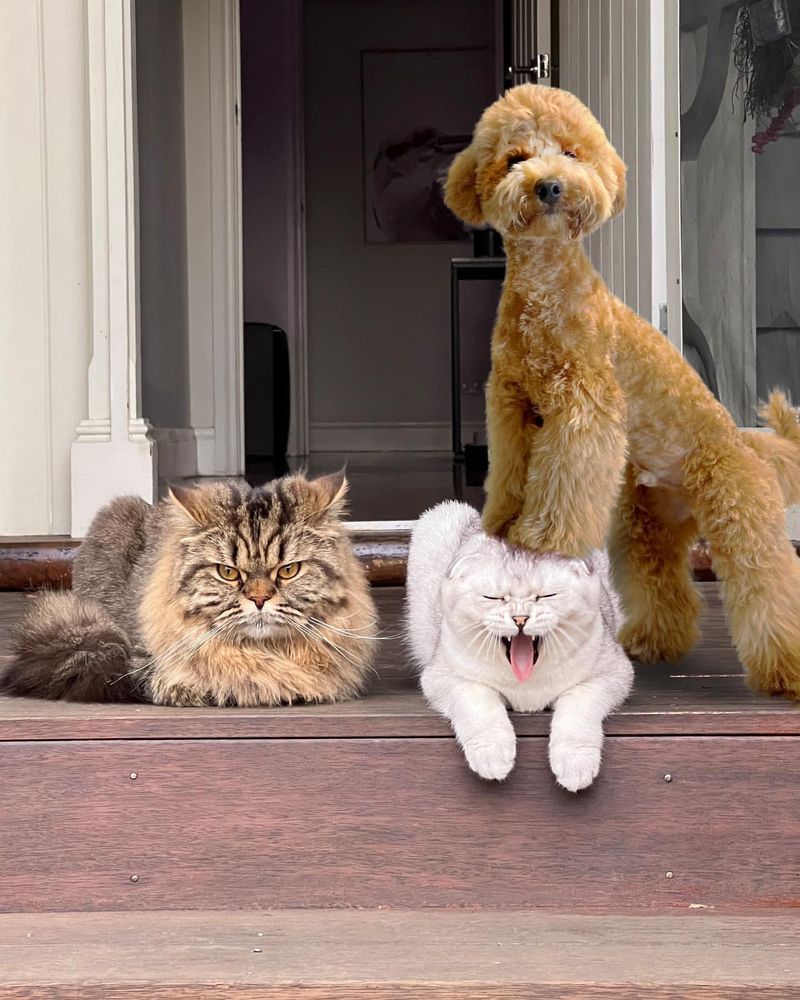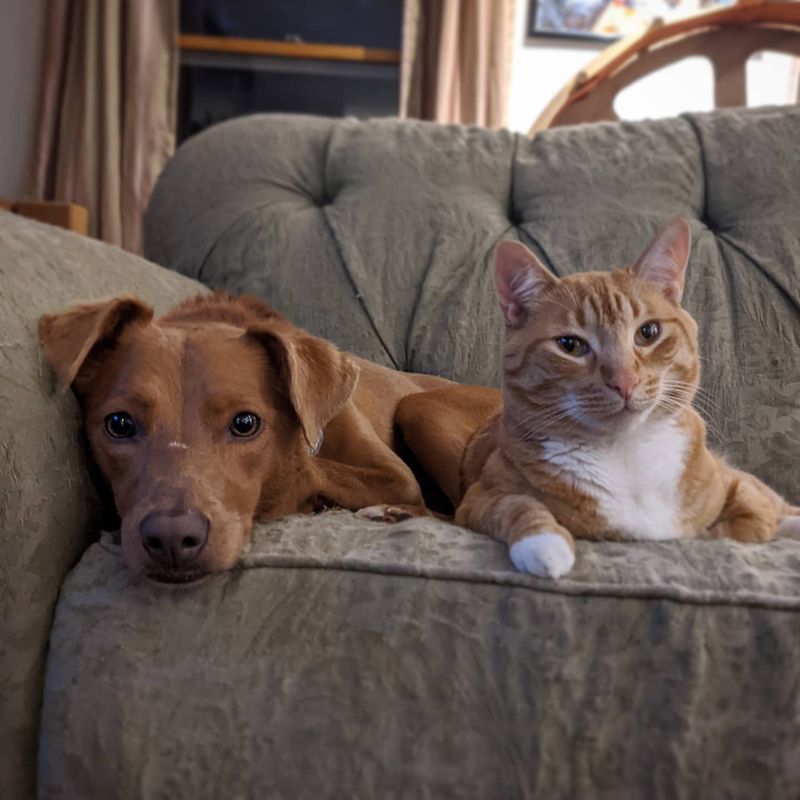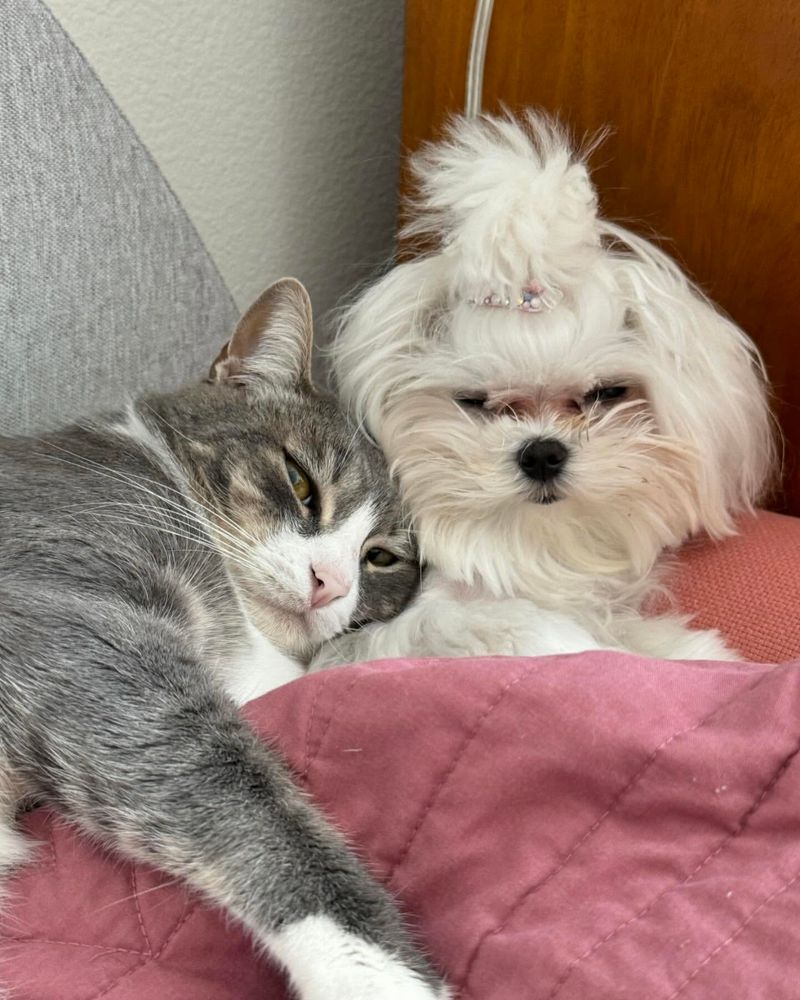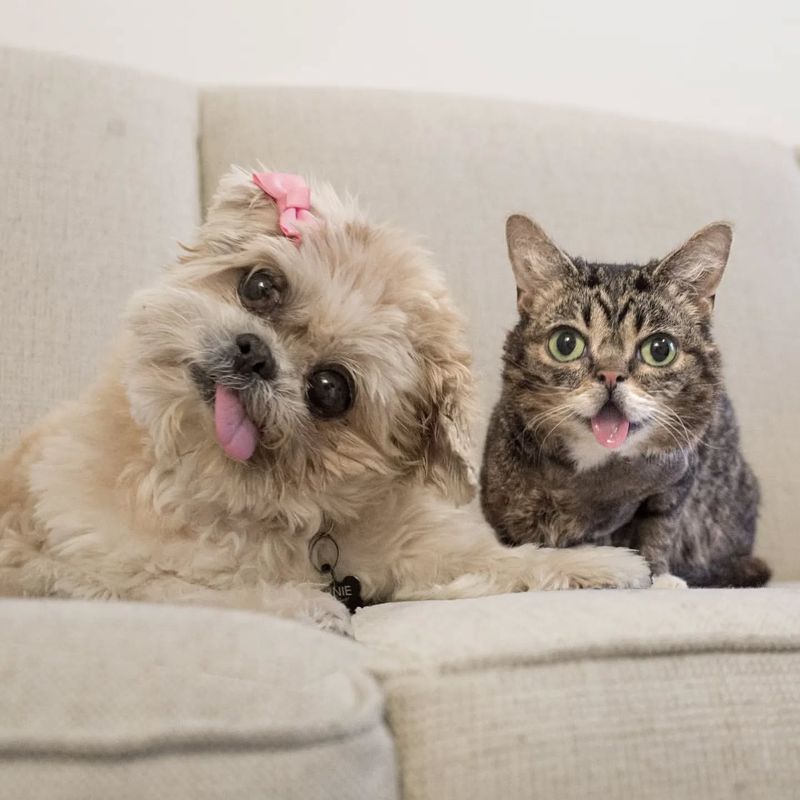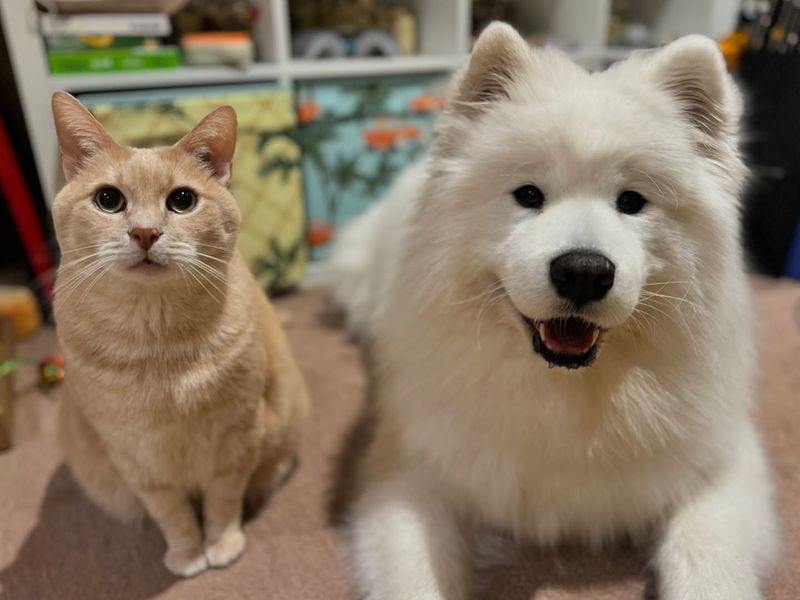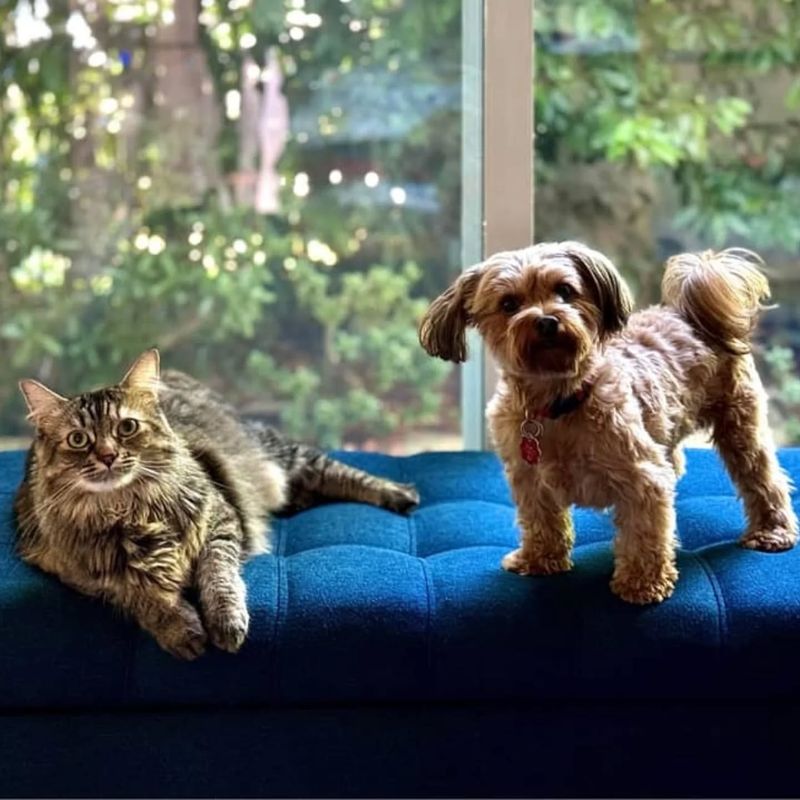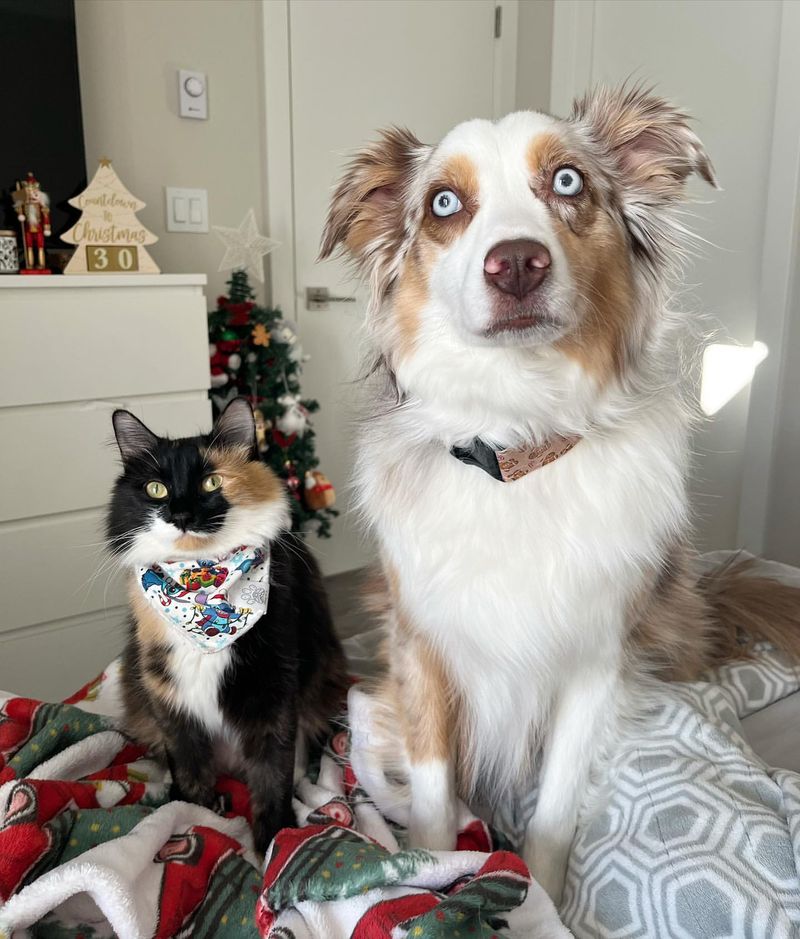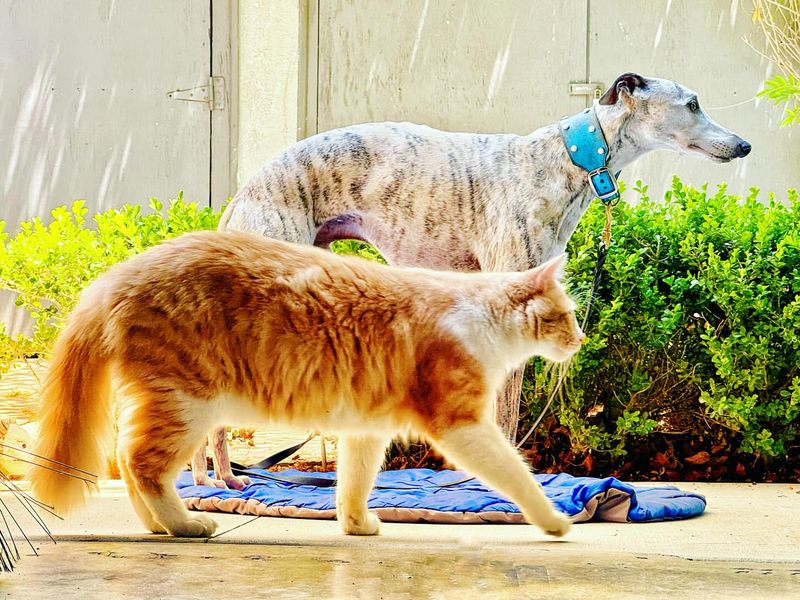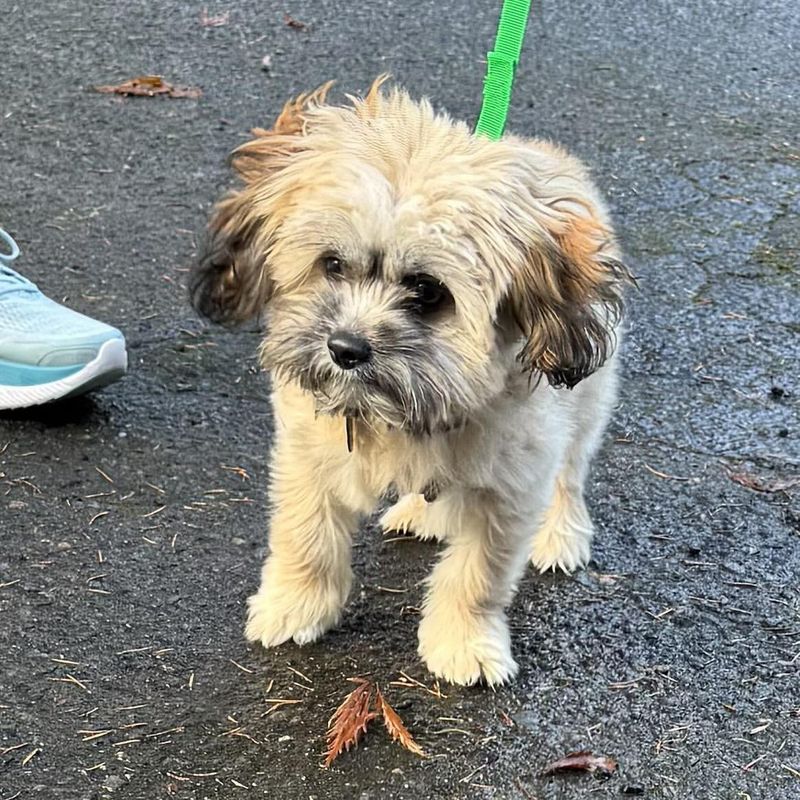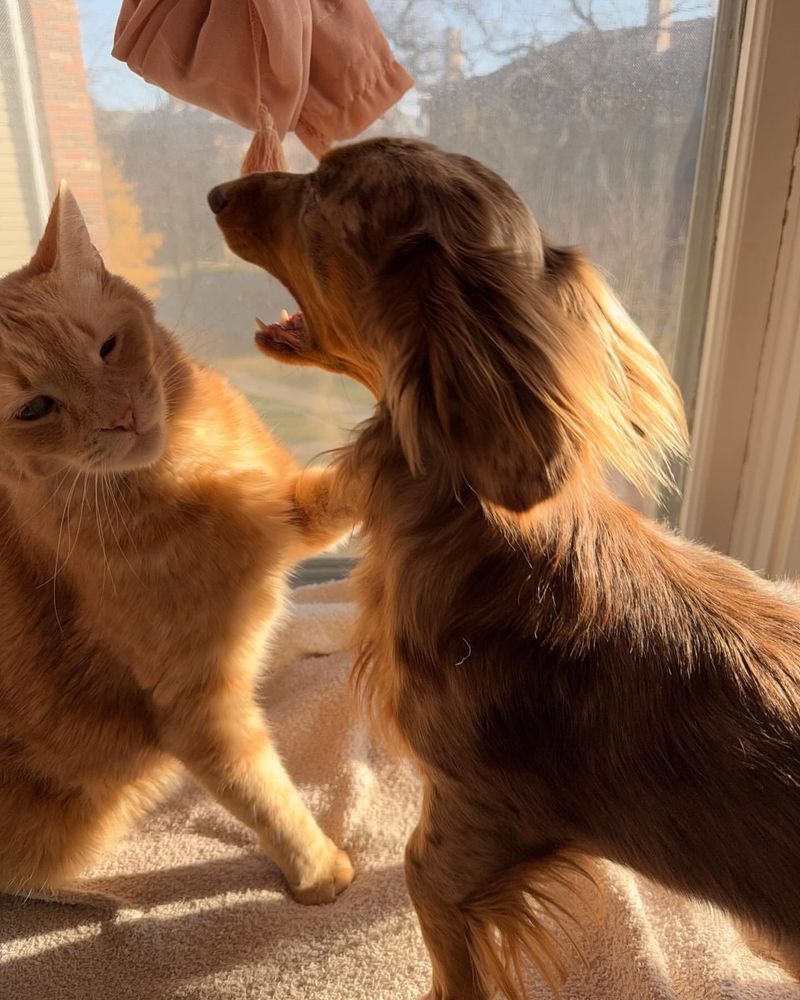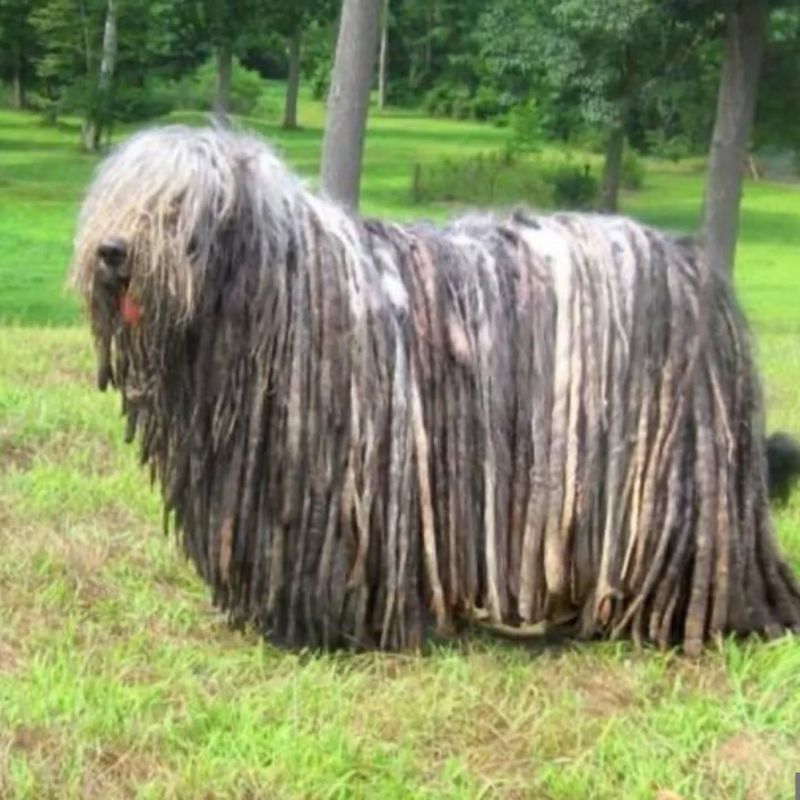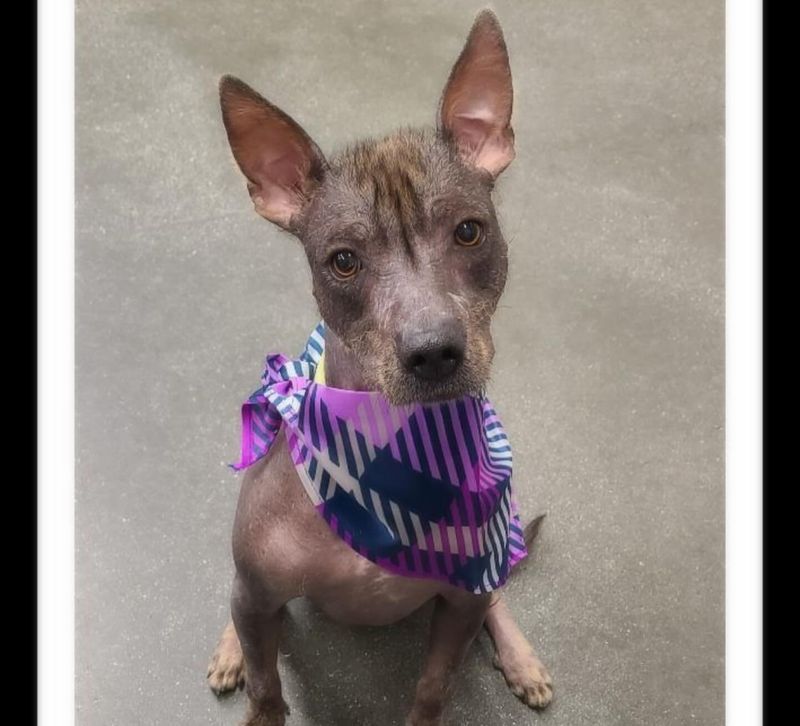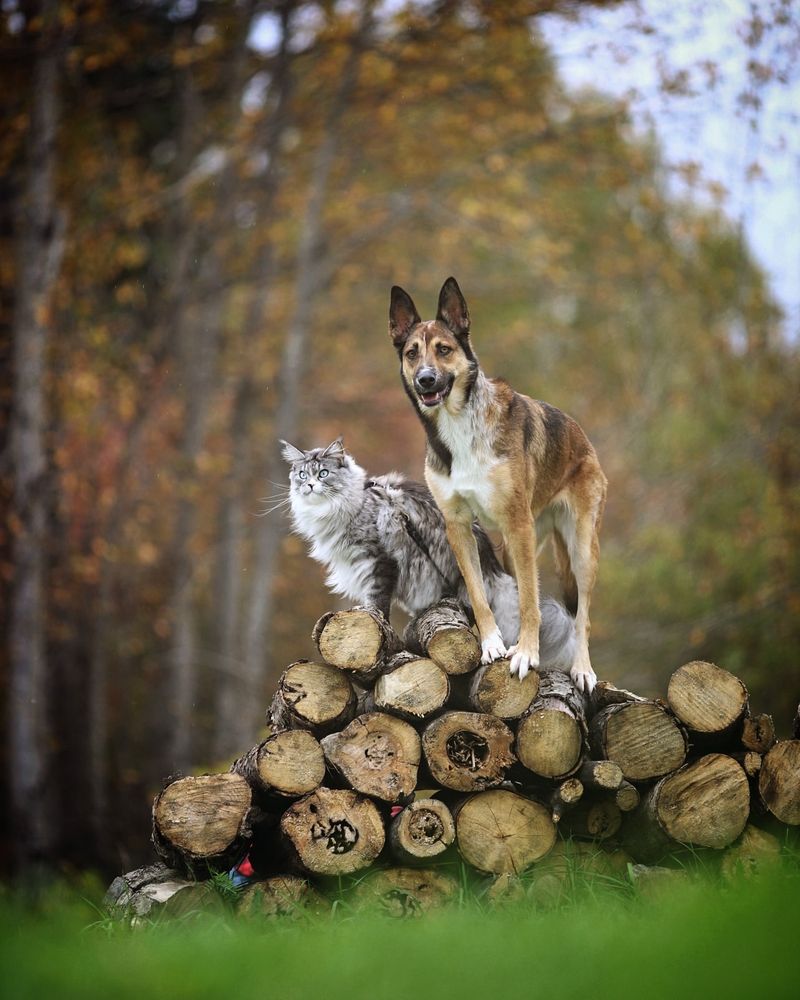Many people believe dogs and cats are natural enemies, but some dog breeds are known for their friendly and gentle nature, making them more likely to get along with feline companions. In this blog post, we’ll explore 28 dog breeds that are surprisingly good at cohabitating peacefully with cats. Whether you’re looking for a dog to join your cat-friendly home or simply curious about which breeds are more adaptable, this list will provide you with valuable insights. Let’s explore these harmonious canine companions and see which might be the perfect fit for your family.
Golden Retriever
Golden Retrievers are well-known for their friendly and tolerant temperament. They are highly adaptable and often form strong bonds with other animals, including cats. This breed’s gentle nature makes them excellent companions, even in multi-pet households. Golden Retrievers are affectionate and patient, qualities that help them get along with cats. They thrive in environments where socialization is encouraged, and with the right introduction, they can coexist peacefully with feline friends. Consideration should be given to their size and energy level when introducing them to smaller pets like cats.
Labrador Retriever
Labrador Retrievers are known for their outgoing and friendly demeanor. They are sociable dogs that enjoy the company of others, including cats. Their playful nature can make them a great match for energetic cats, but they also know when to relax and be gentle. Labradors are intelligent and trainable, making introductions to cats easier if done patiently. Their amiable personality and love for companionship often lead to harmonious relationships with feline housemates. Ensuring both pets have their own space can help foster a peaceful coexistence.
Beagle
Beagles are curious and gentle dogs, traits that often help them get along well with cats. Their playful yet easygoing personalities make them adaptable to living with different animals. Beagles are pack animals and generally enjoy company, which can extend to feline companions once properly introduced. Their small to medium size makes them less intimidating to cats, and their amicable nature paves the way for positive interactions. Providing toys and activities can help channel their energy and prevent any unwanted chasing behavior.
Cavalier King Charles Spaniel
Cavalier King Charles Spaniels are known for their affectionate and gentle disposition. They are friendly with both humans and other animals, making them an excellent choice for homes with cats. This breed’s calm nature allows them to coexist peacefully with feline companions without causing stress or tension. Cavaliers love companionship and are often more than willing to share their space with a cat if introduced gradually. Their small size and gentle temperament make them less likely to engage in aggressive behavior, fostering an environment of mutual respect between pets.
Basset Hound
Basset Hounds are renowned for their laid-back and easygoing nature. They are typically non-aggressive and can form close bonds with cats if introduced properly. Basset Hounds enjoy the company of others and are less likely to view cats as competition. Their calm demeanor and patient temperament often lead to harmonious relationships in multi-pet households. Training and socialization from an early age can further enhance their ability to live peacefully with feline companions. Providing plenty of comfort and space for both pets helps prevent any territorial disputes.
Sheltie (Shetland Sheepdog)
Shelties, or Shetland Sheepdogs, are known for their intelligence and gentle disposition. They are generally affectionate and can adapt well to living with cats. This breed’s herding instincts may cause them to try and herd cats, but with proper training, they can learn to coexist peacefully. Shelties are loyal and enjoy the company of their family, including feline members. Their playful yet considerate nature makes them a suitable choice for homes with cats. Ensuring they have plenty of mental stimulation can prevent unwanted herding behavior.
Boxer
Boxers are playful and energetic dogs that can get along well with cats when properly socialized. Their friendly and outgoing nature often leads to positive interactions with feline friends. Boxers are protective and loyal, which can extend to their relationships with cats. While they may be boisterous during playtime, they are generally gentle and patient. Introductions should be supervised and gradual to allow both pets to adjust. Boxers thrive in environments where they receive plenty of exercise and mental stimulation, which helps prevent any rough play with cats.
Pug
Pugs are known for their affectionate and sociable demeanor. They form strong bonds with their family members, including other pets like cats. Pugs enjoy companionship and are often content to share their space with feline counterparts. Their small size and gentle nature make them less intimidating and more approachable for cats. Pugs are typically laid-back, making them excellent companions in multi-pet households. Their sociable spirit and desire for affection create an environment where cats and Pugs can coexist peacefully. Gradual introductions can help establish a harmonious relationship.
Newfoundland
Newfoundlands are known for their calm and gentle temperament, making them ideal companions for cats. Despite their large size, they are gentle giants, often forming strong bonds with other animals. Newfoundlands are patient and tolerant, which helps them coexist peacefully with feline housemates. Their friendly nature and love for companionship make them well-suited for multi-pet households. Introducing them to cats gradually and providing both pets with their own space can foster positive relationships. Training and socialization from an early age further enhance their compatibility with cats.
Bichon Frise
Bichon Frises are cheerful and friendly dogs that often get along well with cats. Their playful nature and gentle temperament make them suitable companions for feline friends. Bichons are sociable and enjoy the company of others, including cats, as long as introductions are done with care. Their small size and non-threatening demeanor help them interact positively with cats. Bichon Frises thrive on affection and play, making them great companions for playful and sociable cats. Ensuring they have plenty of interaction can help maintain a harmonious relationship with feline housemates.
Collie
Collies are intelligent and calm dogs that can form positive relationships with cats. Their gentle and friendly nature makes them well-suited for living with other animals. Collies are known for their loyalty and protective instincts, which can extend to feline companions. While their herding instincts may initially cause them to try and herd cats, proper training can help them adapt. Collies thrive in environments where they receive mental and physical stimulation, which helps prevent unwanted behaviors. Their patience and willingness to learn contribute to successful cohabitation with cats.
Boston Terrier
Boston Terriers are friendly and adaptable dogs that often get along well with cats. Their small size and affectionate demeanor make them less intimidating and more approachable for cats. Boston Terriers are sociable and enjoy the company of others, which can include feline friends. Their playful and loving nature helps foster positive interactions with cats. Introductions should be gradual to ensure both pets feel comfortable and secure. Boston Terriers thrive in environments where they receive plenty of attention and affection, creating harmonious relationships with cats.
Cocker Spaniel
Cocker Spaniels are known for their friendly and curious nature, making them excellent companions for cats. Their gentle temperament and sociable demeanor allow them to form positive relationships with feline friends. Cocker Spaniels enjoy the company of others and are typically non-aggressive, which helps them coexist peacefully with cats. Providing both pets with their own space and gradual introductions can enhance their compatibility. Their playful spirit and love for companionship create an environment where cats and Cocker Spaniels can thrive together. Training and socialization further contribute to harmonious relationships.
Bulldog
Bulldogs are known for their calm and friendly disposition, qualities that often make them compatible with cats. They enjoy companionship and are generally non-aggressive, creating a harmonious environment in multi-pet households. Bulldogs are laid-back and patient, which helps them get along with feline housemates. Their affectionate nature and love for companionship make them ideal partners for cats. Gradual introductions and providing both pets with their own space can foster positive relationships. Ensuring they have plenty of interaction and comfort helps prevent any territorial disputes.
Papillon
Papillons are known for their cheerful and sociable nature, making them great companions for cats. Their small size and gentle demeanor make them less intimidating and more approachable for feline friends. Papillons enjoy the company of others and are often eager to interact positively with cats. Their playful spirit and friendly disposition contribute to harmonious relationships in multi-pet households. Gradual introductions and providing both pets with their own space can enhance their compatibility. Ensuring they have plenty of mental and physical stimulation helps prevent any unwanted behaviors.
Poodle
Poodles are known for their intelligence and friendly nature, making them suitable companions for cats. Their adaptable temperament and sociable demeanor allow them to form positive relationships with feline friends. Poodles are trainable and eager to please, which helps them learn to coexist peacefully with cats. Their playful yet gentle disposition fosters harmonious interactions in multi-pet households. Providing both pets with their own space and gradual introductions can enhance their compatibility. Ensuring they receive plenty of mental and physical stimulation helps maintain a peaceful relationship with cats.
Vizsla
Vizslas are energetic and gentle dogs that can form strong bonds with cats. Their friendly and affectionate nature makes them excellent companions for feline friends. Vizslas are social animals and enjoy the company of others, including cats, once properly introduced. Their playful yet considerate demeanor helps foster positive interactions with cats. Providing both pets with their own space and gradual introductions can enhance their compatibility. Vizslas thrive in environments where they receive plenty of exercise and mental stimulation, which helps prevent any unwanted behaviors.
Maltese
Maltese dogs are known for their gentle and friendly disposition, making them suitable companions for cats. Their small size and affectionate nature make them less intimidating and more approachable for feline friends. Maltese dogs enjoy companionship and are often content to share their space with cats. Their playful yet gentle demeanor helps foster harmonious relationships in multi-pet households. Gradual introductions and providing both pets with their own space can enhance their compatibility. Ensuring they have plenty of interaction and affection helps maintain a peaceful relationship with cats.
Shih Tzu
Shih Tzus are known for their affectionate and sociable nature, making them great companions for cats. Their small size and gentle demeanor make them less intimidating and more approachable for feline friends. Shih Tzus enjoy the company of others and are often eager to interact positively with cats. Their playful spirit and friendly disposition contribute to harmonious relationships in multi-pet households. Gradual introductions and providing both pets with their own space can enhance their compatibility. Ensuring they receive plenty of mental and physical stimulation helps prevent any unwanted behaviors.
Samoyed
Samoyeds are known for their friendly and gentle nature, making them suitable companions for cats. Despite their large size, they are affectionate and tolerant, often forming strong bonds with feline friends. Samoyeds enjoy companionship and are generally non-aggressive, creating a harmonious environment in multi-pet households. Their playful yet gentle disposition helps foster positive interactions with cats. Gradual introductions and providing both pets with their own space can enhance their compatibility. Ensuring they have plenty of mental and physical stimulation helps maintain a peaceful relationship with cats.
Havanese
Havanese dogs are known for their friendly and gentle disposition, making them excellent companions for cats. Their small size and sociable demeanor make them less intimidating and more approachable for feline friends. Havanese dogs enjoy the company of others and are often content to share their space with cats. Their playful and affectionate nature helps foster harmonious relationships in multi-pet households. Gradual introductions and providing both pets with their own space can enhance their compatibility. Ensuring they have plenty of interaction and affection helps maintain a peaceful relationship with cats.
Australian Shepherd
Australian Shepherds are known for their intelligence and friendly nature, making them suitable companions for cats. Their adaptable temperament and sociable demeanor allow them to form positive relationships with feline friends. Australian Shepherds are trainable and eager to please, which helps them learn to coexist peacefully with cats. Their playful yet gentle disposition fosters harmonious interactions in multi-pet households. Providing both pets with their own space and gradual introductions can enhance their compatibility. Ensuring they receive plenty of mental and physical stimulation helps maintain a peaceful relationship with cats.
Whippet
Whippets are known for their calm and friendly disposition, making them suitable companions for cats. Their gentle nature and sociable demeanor allow them to form positive relationships with feline friends. Whippets are affectionate and enjoy the company of others, often content to share their space with cats. Their laid-back yet gentle disposition helps foster harmonious relationships in multi-pet households. Gradual introductions and providing both pets with their own space can enhance their compatibility. Ensuring they have plenty of interaction and affection helps maintain a peaceful relationship with cats.
Lhasa Apso
Lhasa Apsos are known for their friendly and gentle disposition, making them excellent companions for cats. Their small size and sociable demeanor make them less intimidating and more approachable for feline friends. Lhasa Apsos enjoy the company of others and are often content to share their space with cats. Their playful yet gentle nature helps foster harmonious relationships in multi-pet households. Gradual introductions and providing both pets with their own space can enhance their compatibility. Ensuring they have plenty of interaction and affection helps maintain a peaceful relationship with cats.
Dachshund
Dachshunds are known for their friendly and sociable nature, making them great companions for cats. Their small size and gentle demeanor make them less intimidating and more approachable for feline friends. Dachshunds enjoy the company of others and are often eager to interact positively with cats. Their playful spirit and friendly disposition contribute to harmonious relationships in multi-pet households. Gradual introductions and providing both pets with their own space can enhance their compatibility. Ensuring they receive plenty of mental and physical stimulation helps prevent any unwanted behaviors.
Bergamasco Sheepdog
The Bergamasco Sheepdog is not just a visual spectacle with its matted coat resembling dreadlocks; it’s also a gentle giant known for its calm demeanor.
Originating from the Italian Alps, this breed has been a shepherd’s companion for centuries, valuing harmony and peace. While its appearance might be intimidating, the Bergamasco is quite affectionate and adaptable.
Its shepherding instincts make it protective yet gentle, thus getting along with cats effortlessly. Known for its intelligence and loyalty, it loves family, including any feline members, ensuring a peaceful household.
Xoloitzcuintli
The Xoloitzcuintli, often referred to as the Mexican Hairless, is a breed steeped in history and mystique. Its smooth, hairless body may seem peculiar, but its heart is pure gold.
Known for its calm and affectionate nature, the Xolo is surprisingly amiable towards cats, forming close bonds with them. Its quiet demeanor makes it an ideal companion in a mixed-pet household.
With roots tracing back to ancient Aztec civilization, this intelligent breed is not only a cultural icon but also a loving, low-maintenance guardian for both humans and cats alike.
Norwegian Lundehund
The Norwegian Lundehund is an extraordinary breed, famed for its unique physical traits, including six toes on each paw. This small, agile dog has a history of hunting puffins along Norway’s rocky coasts.
Its adaptability and resourcefulness are matched by a surprisingly friendly attitude towards cats. The Lundehund’s playful nature and curiosity often lead to amusing interactions with feline friends.
Despite its rarity, this breed brings joy and companionship to any home, proving that even the most unusual dogs can make perfect pals for cats. Its cheerful spirit is infectious, creating a lively environment.
